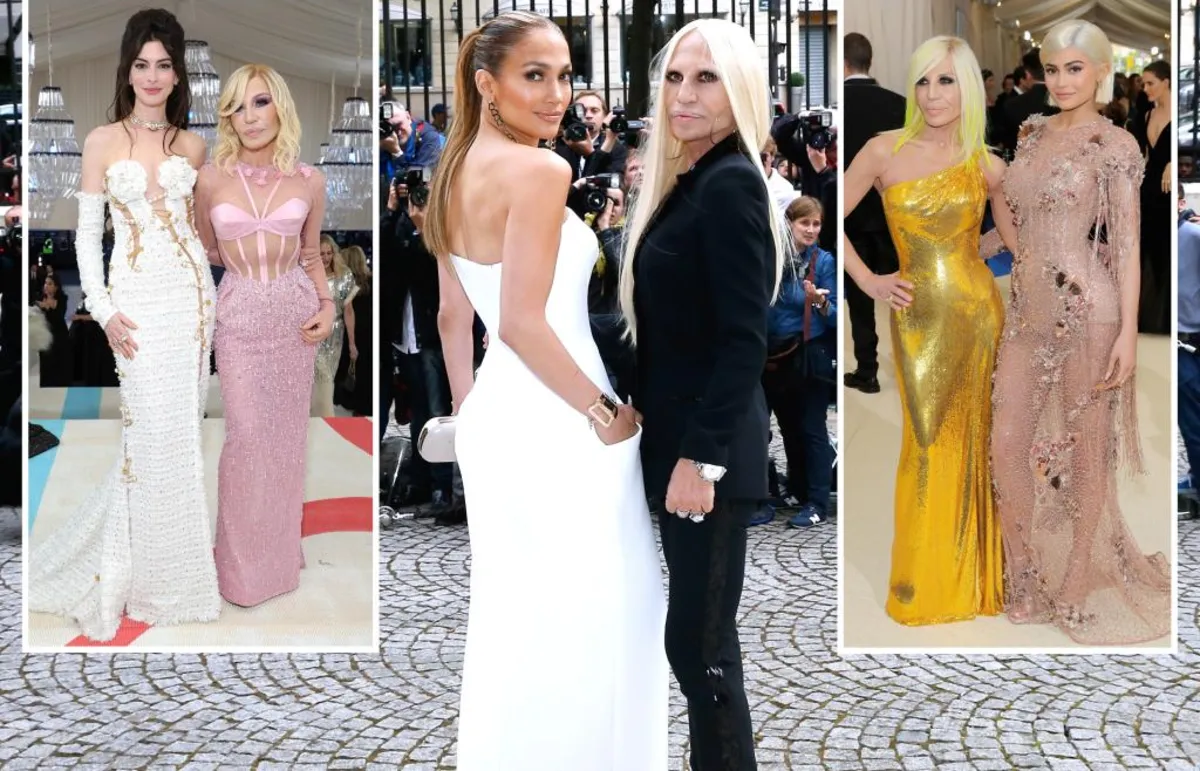
On the night of the Academy Awards earlier this month, Donatella Versace dazzled as she celebrated in style, embodying the elegance and glamour associated with the prestigious event. The renowned fashion designer made a splash with two heavily sequined costume changes at both Elton John’s watch party and Vanity Fair’s annual extravaganza. At 69 years old, Donatella continues to be a significant figure in the fashion industry, known for her vibrant personality and connection to the iconic Versace brand.
As the chief creative officer of Versace, a brand founded by her late brother Gianni, Donatella mingled with notable personalities, including actress Elizabeth Hurley and her son Damian, as well as Amazon tycoon Jeff Bezos and his fiancée Lauren Sanchez. However, while she celebrated in Hollywood, tensions were brewing back in Milan. Reports indicate that plans were underway to remove Donatella from her long-standing role at Versace amid a troubling decline in sales.
A former employee stated, “Donatella is the only thing that drew anyone to Versace,” highlighting that the company’s issues stem from poor management rather than Donatella’s creative direction. This week, it was announced that Donatella would step down from her position as lead designer and transition into the role of chief brand ambassador, while Dario Vitale from Miu Miu is set to assume the role of creative director starting April 1.
Fashion insiders revealed to Page Six that Donatella is now prohibited from using the Versace name for any new ventures she may pursue. This restriction is part of the contract she signed when Versace was sold to John D. Idol’s Capri Holdings in 2018, which also prevents her from designing clothing for any other brands. The situation began to deteriorate when Emmanuel Gintzburger took over as CEO shortly after the $2 billion acquisition, leaving Donatella feeling sidelined in the company that bears her family name.
“The writing was on the wall from day one that Capri wanted to clip her wings,” said a former employee, adding that Donatella was initially open to collaborating on a succession plan. In fact, she recommended Vitale for the position. However, the lack of respect for her creative vision and personal integrity became increasingly apparent, leading to a sense of being undermined.
Donatella Versace, a mother of two, had high hopes for her collaboration with Capri Holdings. Yet, she felt the executives did not regard her as a valued member of the team. “She wanted to protect her family and her legacy. They didn’t give a s–t,” said an insider. Ultimately, Donatella was left at the mercy of Capri, with her creative freedom severely restricted.
Founded in 1978 in Milan by Gianni Versace, the brand quickly became a favorite in the fashion world, celebrated by Vogue and fashion insiders alike. Gianni was instrumental in creating the supermodel phenomenon of the 1990s, elevating figures like Naomi Campbell and Linda Evangelista to iconic status through his innovative designs and high-profile runway shows. His untimely death in 1997, following a tragic murder, left an $800 million empire, with Donatella stepping in to lead the brand despite lacking formal training in fashion design.
Donatella's unique vision transformed Versace into a powerhouse in the fashion industry. Her ability to connect with people and her authenticity made her a beloved figure. According to fashion historian Nancy MacDonell, “When you are parodied on ‘SNL,’ you know you have cultural impact.” Over the years, she has dressed countless A-list celebrities, including Britney Spears, Kim Kardashian, and Gwyneth Paltrow, and is perhaps best known for the iconic green jungle gown worn by Jennifer Lopez at the 2000 Grammys, a moment that famously led to the creation of Google Images.
As Capri Holdings acquired Versace, the brand was among the most recognized names in fashion. However, friction arose behind the scenes, particularly due to differing visions between Donatella and Idol. While Versace was traditionally known for its Medusa logo, Idol reportedly pushed for a more generic monogram approach, similar to other luxury brands. This shift, coupled with price increases, came at a challenging time when global demand for luxury goods began to decline.
Despite reaching $1.1 billion in revenues in 2023, Capri Holdings faced a significant downturn, with revenues dropping by 15.4% between April and June 2024, resulting in an operating loss of $17 million. The outlook for the brand remains concerning, with projected sales declining from $810 million to $800 million in the upcoming financial year. In February, S&P Global Ratings even downgraded Capri Holdings to what Bloomberg Law termed “junk territory,” highlighting performance pressures and high levels of debt.
Amidst these challenges, Donatella expressed her frustrations at a Vogue event in February, stating, “Being told what to do, being told what’s going to sell … If you try to please too many people, too many managers, creativity is gone.” Following the failed attempt to sell Versace to Tapestry for $8.5 billion in 2023, which fell through due to antitrust issues, Capri Holdings is now valued at approximately $2.3 billion, only slightly above what they paid for Versace.
As Idol seeks to refocus on the Michael Kors brand, rumors suggest potential deals to sell Versace and Jimmy Choo. A possible agreement with Prada could bring Versace back under Italian ownership, although the future remains uncertain. While Donatella will always be regarded as integral to Versace’s identity, it’s clear that a new direction is necessary for the brand’s longevity. Fashion insiders believe that under Vitale’s leadership, Versace could find a way to evolve while maintaining its strong sense of identity, especially as the fashion landscape continues to change.
As Donatella stated this week, “Versace is in my DNA and always in my heart.” This sentiment underscores the deep connection she has with the brand she helped build, even as the industry pushes for new leadership and innovative ideas to ensure Versace’s future success.